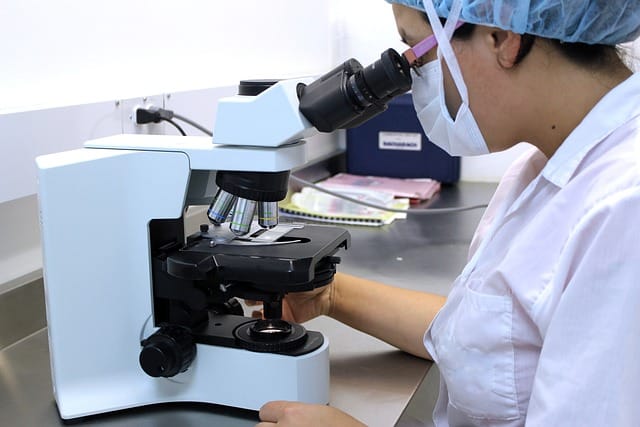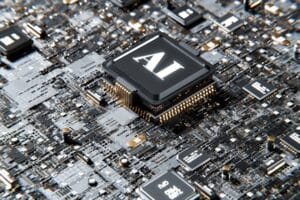AI in drug discovery is significantly accelerating the development of new medicines, marking a pivotal moment in pharmaceutical innovation. Traditional drug development methods, known for their long timelines and high costs, are undergoing transformation thanks to the power of artificial intelligence (AI). These advancements enable researchers to expedite every phase of drug discovery, from initial target identification to the conclusion of clinical trials. By leveraging AI, pharmaceutical companies can bring lifesaving medications to market faster and more efficiently.
This article explores the impact of AI in drug discovery speeding new medicines and its development. We will delve into the various stages of the drug discovery process where AI proves most beneficial, examine the advantages and challenges of using AI, and discuss the future potential of AI-driven drug discovery. Through these insights, it becomes clear that AI holds the potential to revolutionize how new drugs are discovered, developed, and delivered to patients.
The Role of AI Drug Discovery Speeding Up New Medicines
AI technologies have the capacity to analyze vast amounts of data at unprecedented speeds. In traditional drug discovery, researchers would spend years sifting through biological and chemical data manually, but with AI, this process is exponentially faster. AI algorithms can scan large datasets, predict drug-target interactions, and generate insights into drug efficacy and safety.
One of the key ways AI in drug discovery speeds up the development of new medicines is by reducing the need for trial-and-error testing. Instead of manually testing numerous compounds, AI can simulate drug interactions, identifying the most promising candidates early in the process. By shortening the preclinical phase, AI helps get new medicines to patients faster, potentially reducing the drug discovery timeline by several years.
Key Stages in AI Drug Discovery Speeding Up New Medicines
1. Target Identification and Validation
At the outset of drug discovery, researchers need to identify biological molecules or pathways (often proteins) that are associated with a disease—this is known as target identification. In the past, this stage relied on a deep understanding of human biology and extensive laboratory testing. Today, AI can accelerate target identification by analyzing genomic, proteomic, and metabolic data, identifying disease pathways with greater precision.
AI-powered platforms like DeepMind’s AlphaFold have transformed protein structure prediction, which is crucial for understanding how drugs will interact with biological targets. This allows scientists to identify viable drug targets faster and with a higher degree of confidence.
2. Hit Discovery and Compound Screening
Once a target is identified, the next step is to find compounds that can interact with it effectively—this is called hit discovery. Traditional methods would screen thousands of compounds in a wet lab, a process that can take years. AI speeds up this stage by virtually screening millions of compounds in days or even hours. Platforms like ChemSpider provide vast chemical databases, and AI algorithms use these to predict which compounds will likely have the desired biological activity.
Machine learning algorithms can analyze chemical properties, predict toxicity, and suggest modifications to improve drug-like characteristics. This not only accelerates hit discovery but also improves the quality of the leads identified for further development.
3. Lead Optimization
After potential drug candidates are identified during hit discovery, these molecules undergo lead optimization, where their structures are modified to improve efficacy, reduce side effects, and enhance bioavailability. Traditionally, this stage would require numerous iterations of synthesis and testing. With AI, lead optimization is much more efficient.
AI models, such as those employed by Atomwise, simulate how molecular modifications will impact a drug’s interaction with its target, eliminating the need for time-consuming physical testing of every variant. AI also helps predict off-target effects and potential toxicities early in the development process, saving both time and resources.
4. Preclinical and Clinical Trials
Preclinical testing, which involves assessing a drug’s safety and efficacy in animal models, is another phase that benefits from AI. AI-driven models can predict how a drug will perform in these trials, reducing the number of physical experiments needed. Moreover, AI helps design better clinical trial protocols, optimizing patient selection, and predicting how various subgroups will respond to a treatment. This enables clinical trials to be more focused and efficient, further speeding up the process of bringing new medicines to market.
For example, AI can analyze patient data to identify the most suitable candidates for clinical trials, reducing recruitment time and improving trial outcomes. AI also aids in monitoring trial results, detecting adverse effects early, and making real-time adjustments to the trial protocols.
How AI in Drug Discovery Is Speeding Up New Medicines
The phrase “AI in drug discovery speeding up new medicines” encapsulates the overarching theme of this article. By automating and optimizing various stages of drug discovery, AI significantly reduces the time it takes to bring a new drug to market. Pharmaceutical companies are increasingly adopting AI to enhance their research and development efforts, recognizing its potential to save both time and money while improving patient outcomes.
Benefits of AI Drug Discovery Speeding Up New Medicines
1. Accelerated Timelines
The most obvious benefit of AI in drug discovery is its ability to shorten the drug development timeline. Traditional methods can take over a decade to develop and test new drugs, while AI-driven approaches can reduce this by several years. This speed is especially critical in cases of public health emergencies, such as the COVID-19 pandemic, where rapid drug development can save lives.
2. Cost Efficiency
Drug development is notoriously expensive, often costing billions of dollars to bring a single drug to market. AI helps cut these costs by reducing the need for extensive laboratory testing, identifying promising candidates earlier, and eliminating many of the less viable options before they reach the more expensive stages of development.
McKinsey estimates that AI could save the pharmaceutical industry up to $100 billion annually by improving research efficiency and cutting down on failed drug candidates. With AI in drug discovery speeding up new medicines, pharmaceutical companies can allocate resources more effectively, leading to a more sustainable model for drug development.
3. Increased Accuracy
AI’s ability to analyze large datasets and detect patterns that humans might miss enhances the accuracy of drug discovery. By predicting how drugs will interact with biological targets and anticipating potential side effects, AI reduces the likelihood of late-stage failures, which are both costly and time-consuming. The result is a higher success rate for drug candidates and safer, more effective medicines reaching patients.
4. Enhanced Personalization
One of the most exciting applications of AI in drug discovery is its potential for personalized medicine. AI can analyze genetic data to predict how individual patients will respond to specific treatments, allowing for the development of drugs tailored to a person’s unique genetic makeup. This level of personalization can lead to more effective treatments with fewer side effects, revolutionizing patient care.
5. Better Data Utilization
The pharmaceutical industry generates massive amounts of data, from clinical trial results to patient health records. AI excels at analyzing these vast datasets, extracting insights that would be impossible to uncover using traditional methods. By making sense of complex biological data, AI enables researchers to discover new drug candidates faster and with greater precision.
Case Studies: AI Drug Discovery Speeding Up New Medicines
1. Atomwise and Ebola
One of the most remarkable cases of AI in drug discovery speeding up new medicines comes from Atomwise, which partnered with the U.S. Army to discover treatments for Ebola. Using its AI-driven platform, Atomwise was able to screen millions of potential drug compounds in a matter of days, significantly accelerating the discovery process.
2. BenevolentAI and COVID-19
During the COVID-19 pandemic, BenevolentAI used its platform to identify existing drugs that could be repurposed for treating the virus. Within just a week, the company’s AI algorithms had analyzed vast amounts of data and identified a potential treatment. This rapid discovery highlights AI’s potential to address urgent global health crises by speeding up the search for effective medicines.
3. Insilico Medicine and Cancer
Insilico Medicine has leveraged AI to identify new drug candidates for cancer treatment. By analyzing biological data, Insilico’s AI platform predicts which compounds will be most effective against specific cancer types. This approach has significantly accelerated the timeline for cancer drug discovery, offering hope for faster, more targeted treatments for this complex disease.
Challenges and Limitations of AI Drug Discovery Speeding Up New Medicines
While AI holds enormous potential for speeding up drug discovery, several challenges remain.
1. Data Quality
AI models are only as good as the data they are trained on. In drug discovery, ensuring access to high-quality, unbiased data is essential. Incomplete or inaccurate datasets can lead to false predictions, potentially delaying the drug discovery process or leading to costly mistakes.
2. Regulatory Barriers
The integration of AI into drug discovery raises regulatory challenges. Regulatory bodies such as the FDA are still developing guidelines for evaluating AI-driven drugs, and the approval process can be slow. Ensuring that AI models are transparent and explainable is crucial for gaining regulatory approval.
3. Ethical Considerations
The use of AI in healthcare raises ethical concerns, particularly around patient privacy and data security. AI models rely on vast amounts of personal health data, and ensuring this data is used responsibly is essential. Additionally, the potential for biased algorithms to perpetuate healthcare inequalities must be addressed.
The Future of AI Drug Discovery Speeding Up New Medicines
As AI continues to evolve, its role in drug discovery will only grow.
1. Greater Collaboration
We can expect to see more collaboration between pharmaceutical companies, AI startups, and academic institutions. By sharing data and expertise, these entities can accelerate the pace of drug discovery, bringing new medicines to market faster.
2. AI in Personalized Medicine
AI will continue to play a critical role in the development of personalized medicine, where treatments are tailored to individual patients based on their genetic data. This could lead to more effective, targeted therapies for a wide range of diseases.
3. Expansion of AI Tools
We will likely see the rise of more sophisticated AI tools for drug discovery, including open-source platforms that enable researchers around the world to collaborate on developing new treatments. These tools will democratize access to cutting-edge technology, allowing more researchers to contribute to the development of life-saving medicines.
Conclusion
AI in drug discovery speeding up new medicines is transforming the pharmaceutical industry by reducing costs, and improving patient outcomes. By streamlining every stage of the drug discovery process, AI enables researchers to bring new drugs to market faster than ever before. Although challenges remain, the future of AI in drug discovery looks promising. With ongoing advancements and collaboration across industries, AI is poised to revolutionize the way we discover and develop new treatments, offering hope for faster, more personalized, and more effective therapies.
In summary, the incorporation of AI in drug discovery is indeed speeding up new medicines, making it an indispensable tool for the future of pharmaceutical research and development.






